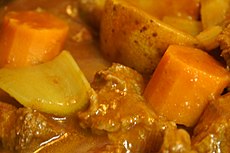Lobscouse
 | |
| Type | Stew |
|---|---|
| Region or state | Northern Europe |
| Main ingredients | Meat, potatoes, occasionally other root vegetables and spices |
Lobscouse (or lapskaus) is a thick Scandinavian stew made of meat and potatoes.[1][2]
Background
[edit]There are many variations of lapskaus. The dish may be made of fresh or leftover meat (usually beef or lamb, but sometimes also chicken, pork, or ham) and potatoes. Other typical ingredients are vegetables (such as carrots, onions, leeks, celery root, and rutabaga), spices (such as pepper or ginger), salt, and herbs.[2][3]
Lapskaus is likely to be linked (historically and etymologically) to the Welsh word lobsgows, a variety of Cawl, which is inherently connected to lobscouse, a European sailors' stew or hash strongly associated with major ports such as Liverpool. Similar dishes include the Danish labskovs, Swedish lapskojs, Finnish lapskoussi, or the German Labskaus.[3][4]
The dish also figures in Norwegian American cuisine.[2] In 1970, lapskaus was part of "the official menu for the seamen's mess" of the Norwegian America Line.[3] Until the 1980s, Brooklyn's Eighth Avenue (particularly between 50th and 60th streets) was known as "Lapskaus Boulevard" in reference to the high Norwegian-American population in the area.[5][6][7]
See also
[edit]- Hash (food) – Culinary dish of chopped meat, potatoes, and fried onions
- Scouse (food) – Stew made from meat, potatoes and onion
- Lobby (food) – Stew made from beef, and potato
References
[edit]- ^ "Lapskaus: a Hearty Norwegian Stew". Nordic Nibbler. November 8, 2010. Retrieved March 1, 2020.
- ^ a b c Sandvold, Irene O. (2011). Gudrun's Kitchen: Recipes from a Norwegian Family. et al. Wisconsin Historical Society Press. pp. 87–89.
- ^ a b c Chotzinoff Grossman, Anne; Grossman Thomas, Lisa (1997). Lobscouse & Spotted Dog: Which It's a Gastronomic Companion to the Aubrey/Maturin Novels. W.W. Norton. pp. 18–19.
- ^ "Lobscouse". Nordic Diner. February 11, 2016. Retrieved March 1, 2020.
- ^ "Lapskaus Boulevard, a tale about Norwegians in Brooklyn, NY". transparent.com. November 7, 2011. Retrieved March 1, 2020.
- ^ Yarrow, Andrew L. (March 17, 1991). "In Brooklyn, Wontons, Not Lapskaus". The New York Times.
- ^ Benardo, Leonard; Weiss, Jennifer (2006). Brooklyn by Name: How the Neighborhoods, Streets, Parks, Bridges, and More Got Their Names. New York University Press. p. 145.
Further reading
[edit]- Lurie, April (2009). Dancing in the Streets of Brooklyn. Dell Yearling. ISBN 978-0385729420.
- Scott, Astrid Karlsen (2011). Authentic Norwegian Cooking. Skyhorse Publishing. ISBN 978-0963433978.
- Sinclair, Charles Gordon (1998). International Dictionary of Food and Cooking. Routledge. ISBN 978-1579580575.
